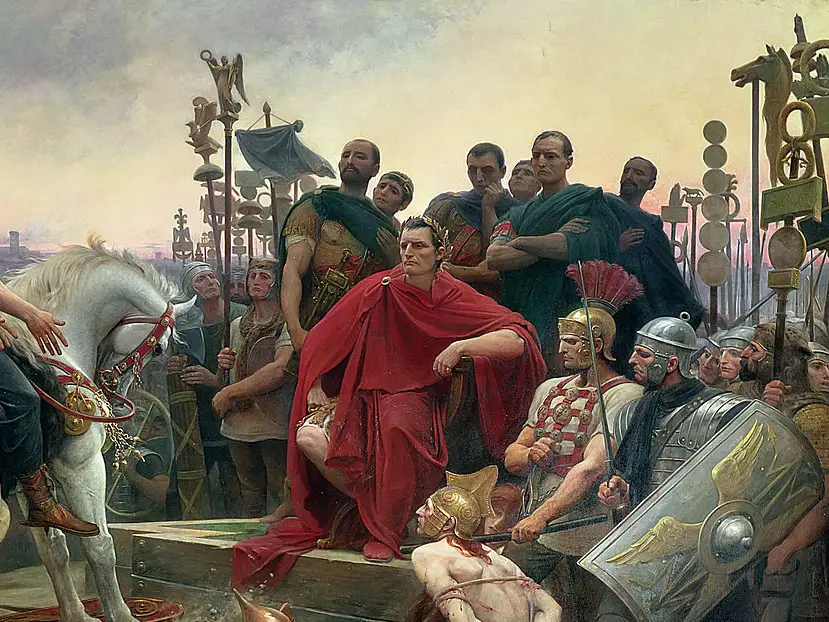
Brief Biography of Julius Caesar
Julius Caesar, born on July 12th or 13th in 100 BC, was a significant figure in the early transformative era of Rome. Born into a patrician family, he was initially a lawyer before being elected into the office of Pontifex Maximus, the head priest of the Roman state religion, in 63 BC. Caesar’s political career accelerated when he formed an alliance known as ‘The First Triumvirate,’ with Marcus Licinius Crassus and Gnaeus Pompeius Magnus, also known as Pompey, in 60 BC.
After winning the Gallic Wars (58-50 BC), he became the dictator of Rome, a title he would hold for four years until his assassination on the Ides of March, 44 BC. Despite his untimely death, Caesar’s profound impact on Roman history, politics and culture is undeniable – his reforms elevated Rome from a republic to an empire, setting the foundation for an era of Roman dominance in European history. His famed clemency, military success, and clear communication skills marked him as an exceptional leader, although his absolute control and disregard for traditional republican values cast a cloud over his legacy.
Importance of the Question
Contemplating the leadership qualities of Julius Caesar strikes at the heart of our collective perception of successful leadership. It draws the spotlight on the perennial debate around power-focused versus people-oriented leadership styles, thus emphasizing the timeless relevance of this issue. By studying the strategies and decisions of individuals who once held immense power, we can explore the potential implications of various leadership styles.
Furthermore, this question opens a gateway to understanding the volatile political dynamics of Rome’s transition from Republic to Empire. Typically, our definitions of good leadership are shaped by our cultural, societal, and individual values. Considering Caesar’s leadership can test the universality of these definitions, offering valuable insights beyond the confines of time. Consequently, by dissecting Caesar’s reign, we take a retrospective journey that can help us better understand the leaders of today and inspire more effective leaders of tomorrow.
Contextual Overview
Political Matrix of Roman Republic in Caesar’s Time
The political milieu in the era of Julius Caesar was fraught with complexities and power struggles. The Roman Republic, which had seen steady progression from a somewhat unstable democracy to a resolute political power, was at a pivotal juncture during Caesar’s time. The Republic was not a monarchy but was ruled by a series of magistrates elected by the citizens of Rome, thereby making it a quasi-democratic state. The two most powerful positions, the Consuls, were annually elected, ensuring a dynamic governmental structure that prevented the absolute dominance of any single individual.
However, its lack of effective constraints on power resulted in the escalating ascendancy of a few dominant personalities that led to civil clashes and political disorder. Caesar, a masterful administrator and military commander, emerged amidst this political turbulence and instability. His reign was marked by his savvy maneuvering within the labyrinthine Roman political framework, enabling him to not only attain a position of unrivaled power but also implement significant reforms that greatly influenced the future course of the Roman Empire.
Shift from Republic to Empire
Under the governance of Julius Caesar, Rome experienced a significant transformation, transcending from a Republic into an Empire. This change was driven by Caesar’s strong leadership and desire for autocracy. He cleverly manipulated the political constructs of the Roman Republic, winning the favour of people and thereby, bringing about the much-needed changes in Roman society. He centralized power and brought stability, indeed paving the way for the Rome’s future as an Empire. However, his methods often drew ire from the Republic’s Senate; his autocratic behaviour was seen by many as undermining the values of the Roman Republic.
Nevertheless, it’s undeniable that Caesar’s reign, despite being short-lived, played an important role in shaping the future of Rome. His autocratic yet formidable leadership facilitated Rome’s shift from a Republic to an Empire, laying a firm foundation which later rulers could expand upon. His reign, hence, marks an important phase in Rome’s historical trajectory.
Caesar’s Leadership Qualities
Military Strategy and Tactics
Undeniably, one of the most exemplary traits of Julius Caesar’s leadership was his exceptional prowess in military strategy and tactics. As a general, he led Rome to several significant victories that not only expanded its territory but also increased its dominance and power in the ancient world. His clever use of psychological warfare, alongside conventional battle strategies, kept his enemies off-balance. Notably, Caesar’s approach to warfare was methodical and calculated.
One of his most remarkable military maneuvers was during the Battle of Alesia. Here, he successfully besieged the town while also constructing fortifications to hold off relief forces, exhibiting tactical wisdom and diligence. Furthermore, his battlefield strategies often demonstrated flexibility and adaptability, adjusting plans according to immediate circumstances while maintaining an aggressive stance toward the enemy. Also, his understanding of the importance of maintaining morale among his troops, coupled with his charismatic persuasion, solidified his role as an influential commander. Thus, it can be asserted that Julius Caesar’s outstanding military acuity was a definitive aspect of his effective leadership.
Oratory Skills and Political Savvy
As a statesman, Julius Caesar displayed impeccable oratory skills and political savvy that significantly contributed to his leadership. He had a phenomenal ability to sway people’s opinions, using his words as powerful tools to inspire, persuade, and mobilize how he saw fit. The speeches he delivered were profound, with each word carefully crafted to invoke emotions, invoking loyalty among his soldiers and admiration among the Roman populace.
Beyond his rhetoric, Caesar demonstrated political astuteness, navigating complex power structures and political webs with ease. He recognized the importance of alliances, forming the First Triumvirate with Pompey and Crassus, thereby influencing the political landscape of Rome. Despite his eventual downfall, Julius Caesar’s shrewd strategies and eloquent speeches place him among the greatest political figures in history. His brand of leadership not only reshaped Rome but also laid the groundwork for the Roman Empire’s emergence.
Ambition and Drive
The relentless ambition witnessed in Julius Caesar arose from an early age and persisted throughout his life, proving to be one of his most remarkable leadership qualities. Caesar’s drive made him relentless in his pursuit of power and advancement; he demonstrated this through the victories he achieved in numerous military campaigns. His ambition was not mere vanity or zealousness for power but instead interconnected with his vision for the Roman state.
Caesar envisioned a Rome with secure borders, prosperous citizenry, and an efficient administration, which were achievable through his planned social, political, and economic reforms. The energy he invested to transform his aspirations into reality indicated a monumental drive that many leaders rarely possess. Therefore, his ambitions and drive to achieve his goals significantly contributed to his success and effectiveness as a leader.
Caesar’s Policies and Decisions
Dictatorial Transition
Under the banner of progressive transformation, Julius Caesar led the transition to a dictatorship in Rome, initiating policy changes and making decisions that have had a profound impact on history. His enactments are viewed by some as proof of his wisdom and excellent statesmanship. He implemented societal reforms that addressed several issues plaguing the Roman Republic, like land redistribution to assist the poor and the overhauling of the calendar system, which was one of the most significant administrative reforms of the ancient world.
On the other hand, it was his dictatorial reign that started a chain of events leading to the eventual downfall of the Roman Republic. Despite the benefits of his policies, his insatiable quest for power disrupted Rome’s traditional system of checks and balances, thus throwing the Republic into chaos. Therefore, assessing Caesar’s qualities as a leader must take into consideration the dichotomous nature of his reign – one featuring significant societal progress while also precipitating an irreversible political crisis.
Social and Political Reforms
Julius Caesar displayed exceptional leadership through his implementation of numerous beneficial social and political reforms. His efforts as a policy maker were primarily focused on the welfare of the common populace. He introduced legislation called the ‘Julian Laws’ that greatly restructured the Roman governance system.
One significant measure was the policy of expanding the senate, thus inviting representatives from formally allied cities and incorporating broader perspectives within the senate. This democratic move promoted equal opportunities and subtly undermined the long-held monopoly of the Roman elites. Furthermore, Caesar instituted social policies intended to alleviate Rome’s ongoing economic crisis. One notable example was the plan to distribute state-owned lands in Italy to the veterans who served in the Roman army — an initiative that catered to the pressing problem of homelessness among former soldiers.
He also initiated public works projects, which provided employment opportunities to many jobless Romans. In summary, Caesar’s leadership in the sphere of social and political reforms proved instrumental in enhancing Rome’s governance and in mitigating critical social issues. His decisions reflected an empathetic and visionary leader, committed to the welfare of all his constituents.
Views on Slavery and Conquest
Julius Caesar demonstrated complex and somewhat contradictory positions concerning slavery and conquest. On one hand, he was known to have conquered vast territories, bringing in numerous captives who were enslaved. The wealth that came with these victories not only boosted the economy of Rome but also bolstered his popularity among the people.
This might suggest that he championed the idea of imperialism and enslavement for his gains, supporting the then prevalent tradition of victors taking losers as slaves. However, on the other hand, Caesar also is credited with a more humane treatment of slaves in his own household and among his friends, even freeing some occasionally. Furthermore, some of his conquered territories, like Gaul, were later granted Roman citizenship, suggesting a possible desire for integration rather than subjugation. Hence, his views on slavery and conquest are not black-and-white, showcasing both the harsh realities of the era and his own nuanced approach towards the matter.
Positive Impacts of Caesar’s Leadership
Advancements and Progress
Julius Caesar played a significant role in advancing the Roman society, showcasing his effective leadership. He introduced a plethora of reforms which led to progress on multiple fronts. He instigated a major land reform which helped heardless Romans by giving farms to thousands of them. Caesar also recognized the importance of education, championing for the establishment of public libraries to encourage enlightening discussions among the city’s scholars. The undeniable progress that Rome experienced was not just confined within its borders but extended globally.
This global influence is attributable to his successful establishment of multiple colonies outside Italy, which significantly expanded the Roman influence. To further Rome’s economic prosperity, he introduced a new calendar, the Julian calendar, which was more accurate and advanced than its predecessor. The successes that stemmed from Caesar’s advancements and reform policies, show strong evidence of his effective leadership.
Enduring Legacy Throughout History
The enduring legacy of Julius Caesar’s leadership resonates consistently throughout history, and marks a crucial event in Rome’s transformation from a republic to an empire. He enforced crucial reforms to resolve the social and economic issues plaguing Rome during his rise. The introduction of the Julian calendar, for example, demonstrated his vision for a unified system of timekeeping that is still in use today. His clemency towards defeated political opponents illustrated his unique blend of strategy with humanity, a trait often missing in rulers of the era.
Furthermore, his leadership stimulated Rome’s transformation into a bustling metropolis by expanding its territorial ranges, leading to a surge in wealth and cultural diversity. Despite his ruthless pursuit of power that eventually led to his own demise, Caesar’s ability as a field commander and a city builder echo strongly in our understanding of a progressive leader. His political reforms though peak towards autocracy, in their essence aimed towards social and economic equality. Thus, his leadership was and continues to be emblematic of an effective leader who left behind a lasting legacy.
Negative Impacts of Caesar’s Leadership
Authoritarianism and Autocracy
In a critical examination of Caesar’s leadership style, one cannot overlook the elements of authoritarianism and autocracy, which had stark negative effects on the Roman Republic. Julius Caesar’s consolidation of power often overstepped the bounds of the law, ultimately eroding the participatory governance system that the republic had been founded upon.
His modification of the constitution to secure his status as ‘dictator for life’ not only demonstrated his unrestrained ambition, but also set a dangerous precedent leading Rome down a path of absolute leadership. Furthermore, by concentrating power in his hands, he created a power vacuum upon his assassination, resulting in a chaotic and violent power struggle. This period of uncertainty eventually ended with the establishment of the Roman Empire, curtailing the Roman Republic’s democratic experiment. Despite his tactical genius and numerous reforms benefiting Rome, these autocratic tendencies mark a significant black spot on his leadership record.
Assassination and Aftermath
The culmination of Caesar’s leadership came with a brutal end – his assassination. This event invariably unveils some of the negative implications of his rule. His authoritarian grip on power and the significant changes he championed led to a mounting pool of disgruntled senators. Those senators, in their frustration and fear, conspired to slay Caesar in hope of preserving the Roman Republic.
This act of violence not only revealed deep divisions within the ruling classes but also led to a period of civil wars, causing widespread societal instability and devastation. Julius Caesar’s inability to assert a leadership style that securely balanced the interests of different groups may be seen as one of his principal failures. Despite his many notable achievements, his reign ended in chaos and discord, which greatly marred Rome’s advancement.
Comparative Analysis
Similarities and Differences with Other historical Leaders
In the grand tapestry of history, it’s intriguing to draw comparisons between Julius Caesar and other notable historical leaders. One striking resemblance can be seen in the virtues he shared with Alexander the Great; both showcasing exceptional military prowess and grand ambition. They revolutionized their armies and strategically outsmarted their adversaries, leading to significant territorial expansions. However, their styles of leadership diverged on the grounds of maintaining internal peace.
Unlike Alexander, Caesar demonstrated greater political acumen in managing Rome’s intricate power structures, thereby ensuring stability within his kingdom. On another note, when paralleled with Hannibal Barca, Caesar was a leader who lacked the Carthaginian general’s doggedness. While Hannibal’s military strategies have been much praised, Caesar’s innovative reforms for Roman society, such as overhauling the calendar system and advocating for public works, suggest he had a broader vision.
Nevertheless, like all leaders, they were men of their time subjected to both praise and criticism. While some laud Caesar for his central role in the transformation of the Roman Republic into the Roman Empire, others have focused on his autocratic rule and the subsequent consequences. Ultimately, determining the virtues of a ‘good’ leader often relies on one’s criterion of assessment.
Evaluating Leadership Through the Lenses of Different Cultures
Diving deep into an intercultural perspective of Julius Caesar’s leadership, his qualities and conduct as a leader become subject to varied interpretations. Western societies, particularly those deeply rooted in democratic values, may view Caesar’s move towards dictatorship and absolute power following his appointment as ‘perpetual dictator’ with some skepticism.
His autocracy could be contrasted negatively with today’s ideals of democratic leadership and collective decision-making in these societies. However, ancient cultures with a tradition of strong central leadership, such as China’s historical dynasties, might view his consolidation of power and authoritarian rule on a more favorable note. His ability to maintain control, establish a unified Roman Empire, and enforce reforms align with Confucian ideals of a ‘benevolent ruler’. Therefore, assessing Julius Caesar’s effectiveness as a leader requires cultural contextualization, which often reveals contrasting viewpoints.
Conclusion
Recap and Final Thoughts
In retrospect, it’s clear that Julius Caesar’s leadership abilities remain a subject of great debate centuries after his death. His audacious strategies during military campaigns showcased a knack for innovative tactics while his economic and social reforms caused significant improvement in the life of Roman citizens.
Despite his authoritarian rule, which incited accusations of tyranny, his ability to gain popular support and maintain control can’t be discounted. However, his inclination towards absolute power potentially triggered the downfall of the Roman Republic. Although his ethical compass often wavered, Caesar’s unquestionable bravery, charisma, political acumen, and military expertise confirm his standing as an impactful leader. Therefore, mounting evidence suggests that Julius Caesar, albeit flawed, fits the description of an effective leader to a considerable extent.
Evolving Perceptions of Leaderly Effectiveness and Morality
In the final analysis, the evolving perceptions of Caesar’s leadership effectiveness and morality continue to be a topic of debate and reflection. Despite negative instances such as his penchant for self-aggrandizement, his questionable morality, and his role in the demise of the Roman Republic, Caesar’s contributions to governance, infrastructure, and societal reform cannot be overlooked, contributing significantly to the shaping of the Roman Empire.
Even his execution through a senatorial conspiracy, cruel as it was, led to a more consolidated autocratic rule and, hence, in some measure, greater stability. It is this complex interplay between his virtues and vices that makes him an intriguing study in leadership. His blend of military acumen, political savvy, administrative reforms, and personal charisma, juxtaposed with ruthless ambition and a disregard for Republican values, continues to evoke polarized views, thereby making him a compelling figure perennially under the scanner of leadership analysis. Today’s leaders may learn from their strengths and weaknesses, leading to evolved perceptions of what constitutes truly effective leadership.



